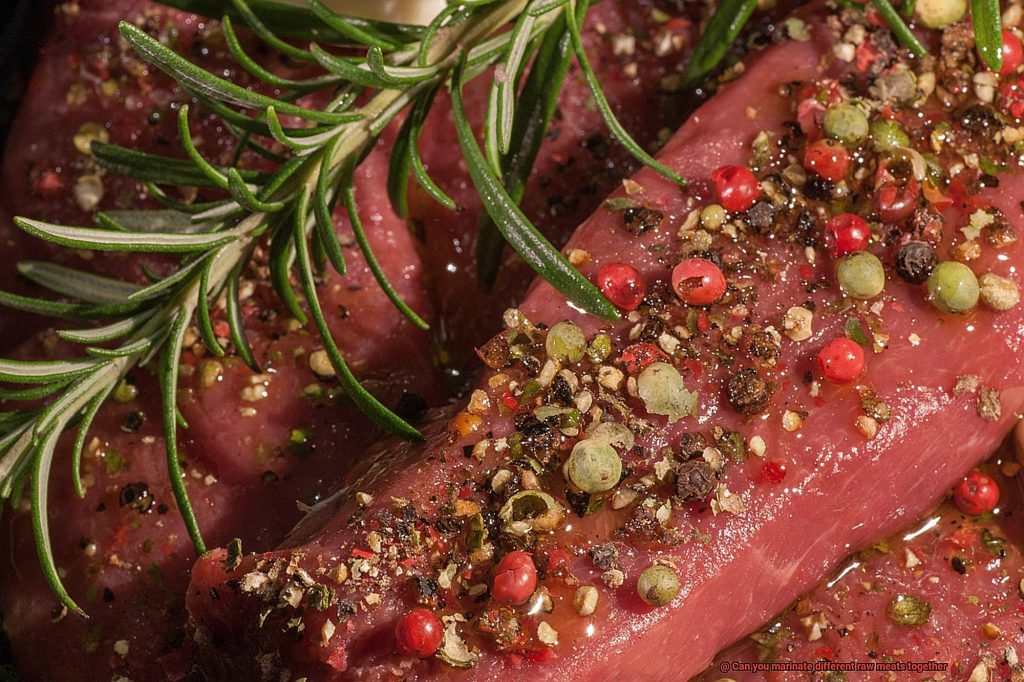Are you a meat lover who enjoys the rich and vibrant flavors that marinating brings to your dishes? If so, you might be curious about whether it’s possible to marinate different raw meats together. Can you really toss in some chicken, beef, and pork into a single marinade and still get mouthwatering results?
Well, the answer isn’t as simple as a yes or no. While combining different meats in one marinade may seem like a time-saver, it can also pose serious food safety concerns. Each type of meat has its own unique cooking times and temperatures, which means they require distinct handling and preparation methods.
For example, poultry must be cooked at higher temperatures than beef or pork to eliminate harmful bacteria such as salmonella. Mixing raw meats together can also lead to cross-contamination where bacteria from one cut of meat transfers onto another piece of meat.

But fear not. There are ways to safely marinate different raw meats together without putting yourself or your loved ones at risk. In this post, we’ll delve into the nitty-gritty details of how to do so deliciously and safely. So let’s dive in and learn everything you need to know about mixing up your marinades.
Contents
Potential Risks of Cross-Contamination

When it comes to marinating raw meats, there’s a potential risk that many overlook: cross-contamination. This hazardous process occurs when harmful bacteria from one meat contaminates another meat or food product, leading to severe foodborne illnesses such as salmonella, E. coli, and listeria.
The primary culprits for cross-contamination during marination are meat juices and marinades. Once different types of meat are marinated together, their juices mix, creating an environment for bacteria to grow and spread. Additionally, marinades containing raw meat can also transfer bacteria to other foods and surfaces they come into contact with.
To avoid the perils of cross-contamination, it is paramount to handle raw meats with care when marinating them. This includes using separate containers for each type of meat and storing them separately in the refrigerator. It is also crucial to use separate utensils and cutting boards for each type of meat to prevent cross-contamination.
Moreover, washing hands thoroughly before and after handling raw meat is essential to mitigate the spread of harmful bacteria. Experts recommend washing hands with warm water and soap for at least 20 seconds to ensure every nook and cranny is free of bacteria.
When deciding which meats to marinate together, it’s vital to consider their cooking times and temperatures. Choosing meats that have similar cooking times and temperatures can reduce the risk of bacterial growth. It’s also important to think about the flavor profiles of the different meats when marinating them together. Combining meats with vastly different flavors or textures may not result in a cohesive or desirable end product.
Safety Tips for Marinating Different Raw Meats
Marinating different raw meats together can be a delicious way to add some flavor and variety to your meals. However, it is important to keep safety in mind while doing so. Here are five essential safety tips to help you marinate different raw meats together safely:

Keep Meats Separate
Always use separate containers or bags for each type of meat to avoid cross-contamination. Even if the marinade is the same, keeping the meats separate will prevent any harmful bacteria from spreading.
Wash and Trim Meat
Before marinating, make sure to wash and trim the meat properly. This helps to remove any bacteria or unwanted substances that may be present on the surface of the meat. It is also important to ensure that the meat is fully submerged in the marinade to prevent any parts from being left exposed.
Refrigerate Marinating Meat
Always marinate meat in the refrigerator, as this helps to slow down bacterial growth and keep the meat safe. Leaving meat at room temperature or outside for too long can lead to harmful bacteria growing rapidly and increasing the risk of food poisoning.
Cook Thoroughly
It is important to cook marinated meats thoroughly before consumption. Use a meat thermometer to ensure that the meat has reached a safe internal temperature. This ensures that any harmful bacteria present in the meat are killed off, making it safe for consumption.
Don’t Reuse Marinade
Do not reuse marinade that has come into contact with raw meat unless you bring it to a boil first to kill any bacteria. Using leftover marinade from raw meat can increase the risk of bacterial growth and foodborne illness.
Considerations for Flavor Profiles When Marinating Different Meats
Marinating different raw meats together can take your taste buds on a culinary adventure, but it’s crucial to consider each meat’s flavor profile to ensure a mouth-watering outcome. As an expert in the field, I’ve compiled some research notes to guide you through the considerations for flavor profiles when marinating different meats.
Firstly, each meat absorbs marinades differently based on varying levels of fat and tenderness. Beef and lamb are typically robust in flavor and can handle strong marinades with bold spices and herbs. In contrast, chicken and pork have milder tastes and benefit from lighter marinades with citrus or vinegar-based ingredients.
When combining different meats in a marinade, it’s crucial to balance the flavors to avoid overpowering one meat over the others. To achieve this balance, try using complementary ingredients. For instance, garlic, onion, and soy sauce can bring out the natural flavors of both chicken and beef when used together.
Another essential consideration when marinating different meats is cooking times. Each meat requires varying amounts of time to marinate and cook properly. Therefore, choose a marinade that complements all meats’ cooking times to ensure they cook evenly.
Separate Containers and Utensils for Each Type of Meat
If so, it’s important to know that cross-contamination can be a serious concern when handling raw meats. But fear not – as an expert in the field, I’m here to guide you through the best practices for marinating different types of meat.
The first step is to use separate containers and utensils for each type of meat. This means having different cutting boards, knives, and other utensils for chicken, beef, pork, and any other meats you plan to marinate. By doing so, you’ll avoid the risk of bacteria transferring between meats and ensure that each meat retains its unique flavor profile.
Cross-contamination can occur when bacteria from one type of meat spreads to another. For example, if you marinate chicken in a container and then use the same container to marinate beef, any bacteria from the chicken will be transferred to the beef. This can lead to foodborne illness and ruin your culinary masterpiece.
In addition to using separate containers and utensils, proper cleaning and sanitization are key to preventing cross-contamination. Make sure to clean all containers and utensils thoroughly before and after use to kill any bacteria that may be present.
To summarize, here are some tips for marinating different types of meat safely:
- Use separate containers and utensils for each type of meat.
- Clean and sanitize all containers and utensils before and after use.
- Avoid using the same utensils or surfaces for raw meats and cooked foods.
Choosing Meats with Similar Cooking Times and Temperatures
Today, we are going to talk about one of the essential aspects of marinating different types of meat – choosing meats with similar cooking times and temperatures.
When it comes to cooking meat, timing is key. Each type of meat has its unique texture, density, and flavor profile, which requires a specific cooking time and temperature. Therefore, selecting meats that have similar cooking times and temperatures is crucial when marinating them together.
So, how do you know which meats have similar cooking times and temperatures? Let’s take beef cuts as an example. Sirloin, flank, and tri-tip are all beef cuts that have similar thickness and require similar cooking times. So, they can be marinated together without any issues. Similarly, chicken thighs and drumsticks have similar cooking times and temperatures, making them perfect candidates for joint marinades.

However, not all meats are created equal in terms of cooking times and temperatures. For instance, pork chops and chicken breasts should not be marinated together since they require different cooking times and temperatures. Pork chops need a higher temperature and longer cooking time than chicken breasts. If you marinate them together, the chicken breasts may be overcooked while the pork chops are still undercooked.
Another crucial factor to consider when choosing meats with similar cooking times and temperatures is the type of marinade used. Certain marinades may contain acidic ingredients such as vinegar or citrus juices that can break down meat fibers quickly. Therefore, it is essential to choose marinades that complement the selected meats’ textures and flavors without overpowering them.
The Best Marinades for Different Types of Raw Meat
Marinades are a fantastic way to add depth and complexity to raw meat before cooking, but not all marinades work equally well with different types of meats. To ensure that your meats taste their best, it’s important to select the right marinade for each type of meat. Here are some tips on how to choose the best marinade for different types of raw meat.
Beef
When marinating beef, you’ll want to use a marinade that enhances the meat’s natural flavor while also tenderizing it. A classic beef marinade includes soy sauce, Worcestershire sauce, garlic, and black pepper. This combination adds a savory umami flavor to the beef while also breaking down tough fibers and making it tender.
Chicken
Chicken is a versatile meat that can take on a variety of flavors. For a delicious chicken marinade, try combining lemon juice, olive oil, minced garlic, rosemary, and thyme in a bowl. Marinate your chicken for at least 30 minutes before grilling or baking to allow the acid in the lemon juice to break down the proteins in the chicken and create a tender and flavorful dish.
Pork
Pork pairs particularly well with sweet and tangy marinades that complement its natural flavor. A honey-mustard marinade made with apple cider vinegar and paprika is perfect for pork. The sweetness of the honey balances out the tanginess of the vinegar, creating a well-rounded flavor.
Fish
Fish is delicate and requires a simple marinade that won’t overpower its natural flavor. Try a lemon-herb marinade made with olive oil, dill, or parsley for a subtle yet delicious flavor boost. Be sure not to over-marinate fish since it can break down the flesh and turn it mushy.
When marinating different types of raw meats together, it’s crucial to avoid cross-contamination by using separate containers and utensils for each type of meat. Additionally, be aware of the marinating time since different meats require different amounts of time to absorb the flavors. By following these tips, you can create delicious and flavorful dishes that will leave your guests impressed.
The Benefits of Marinating Different Raw Meats Together
It’s a simple yet effective way to add variety to your meal prep and take your dishes to the next level. Let’s dive into the benefits of this method.
Firstly, combining different meats in one marinade saves time and reduces waste. Instead of preparing separate marinades for each type of meat, you can create a delicious concoction with all your ingredients in one bowl. This not only saves time but also prevents leftover ingredients from going bad.
Secondly, marinating different raw meats together can help tenderize tougher cuts of meat. The enzymes in the marinade break down connective tissue, making the meat more succulent and easier to chew. For instance, if you’re marinating chicken breast and flank steak together, both will benefit from the tenderizing effects of the marinade.
Lastly, marinating different raw meats together can open up new flavor possibilities. By experimenting with different meat combinations, you can come up with unique and complex flavor profiles that will tantalize your taste buds. For example, a citrus-based marinade would complement both chicken and shrimp perfectly, while a bold and spicy marinade would bring out the best in pork and beef.
How to Store and Reheat Your Marinated Meals
Marinating your meats can add a lot of flavor and texture to your dishes. However, it is important to remember that marinated meats should be stored and reheated properly to prevent foodborne illness. Here are some tips on how to store and reheat marinated meals safely.
Store Marinated Meats in the Fridge
Storing marinated meats in the refrigerator is crucial to keep them fresh and safe for consumption. It is recommended to store the meat at a temperature of 40°F or below. The longer the meat has been marinated, the longer it should stay in the fridge. Additionally, storing different types of meats separately in airtight containers or resealable plastic bags can prevent cross-contamination.
Label Your Containers
Labeling your containers with the type of meat and the date it was marinated helps keep track of freshness. This way you can ensure that you use up your marinated meats before they expire.
Reheat Your Meat Thoroughly
Reheating your marinated meat thoroughly is crucial to eliminate any bacteria that may have grown during storage. The USDA recommends reheating all leftovers to an internal temperature of 165°F. To ensure even reheating, it’s best to use an oven or stovetop rather than a microwave.
Use Separate Containers for Different Types of Meat
Using separate containers for different types of meats prevents cross-contamination and reduces the risk of foodborne illness. For instance, if you’re marinating chicken and beef, store them in different containers.
Check Your Marinade’s Expiration Date
Always check the expiration date on your marinade before using it. Expired marinade could contain harmful bacteria that can cause food poisoning.
F-wU562XZYQ” >
Conclusion
In conclusion, combining different raw meats in a marinade can elevate your culinary game and tantalize your taste buds. However, it’s crucial to handle the meats with utmost care and prioritize food safety. The risk of cross-contamination is real and can lead to severe foodborne illnesses that no one wants.
To avoid any mishaps, always use separate containers and utensils for each type of meat when marinating them together. Proper cleaning and sanitization are also paramount to prevent any bacteria from multiplying.
When deciding which meats to combine, consider their cooking times and temperatures. It’s best to pair meats with similar cooking times and temperatures to ensure they cook evenly without compromising flavor or texture.
Choosing the right marinade is another critical factor to keep in mind. Different types of meat require different marinades that complement their distinct flavor profiles. Beef, chicken, pork, and fish all have unique characteristics that demand specific marinades.
Lastly, storing and reheating marinated meals correctly is essential for preventing foodborne illness. Be sure to label containers with the type of meat and date of marination to keep track of freshness. Reheating leftovers thoroughly at an internal temperature of 165°F is highly recommended.
In summary, marinating different raw meats together can be a thrilling way to experiment with new flavors while prioritizing food safety.






